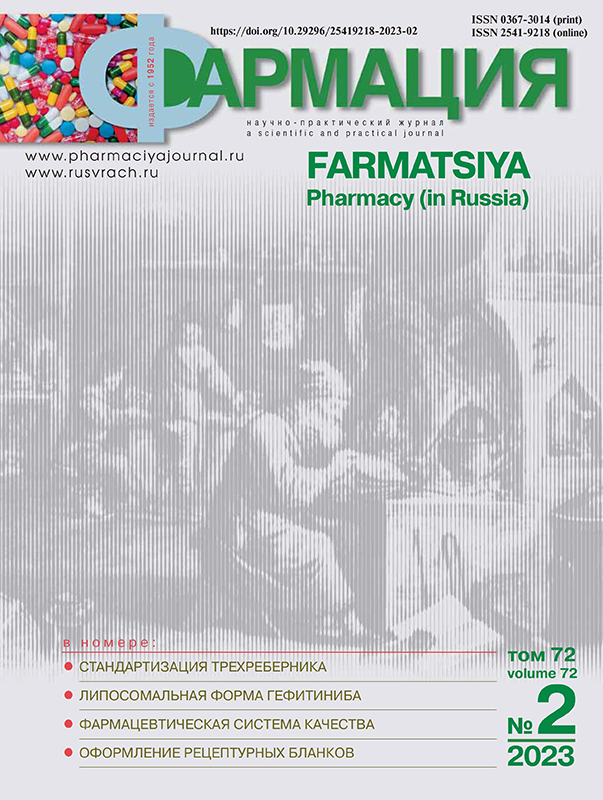The role of building a unified approach to the pharmaceutical quality system for the harmonious development of the pharmaceutical industry in the EAEU
- Authors: Goryachkin V.V.1,2, Grigorova L.I.2, Gegechkori V.I.2, Chadova N.N.3, Rodionova G.M.2
-
Affiliations:
- State Institute of Drugs and Good Practices and Good Practices, , Russian Federation
- Sechenov First Moscow State Medical University (Sechenov University)
- State Institute of Drugs and Good Practices and Good Practices
- Issue: Vol 72, No 2 (2023)
- Pages: 22-27
- Section: Technology of medicines
- URL: https://journals.eco-vector.com/0367-3014/article/view/321910
- DOI: https://doi.org/10.29296/25419218-2023-02-04
- ID: 321910
Cite item
Abstract
Introduction. The publication discusses the relevant model of building harmonized quality management systems (QMS) at pharmaceutical enterprises of the Eurasian Union (EU) countries.
Objective: to comprehensively study approaches for the creation of integrated quality management systems at pharmaceutical companies and to define the importance of implementing unified PQS management systems for the harmonious development of the pharmaceutical market in the Eurasian Union.
Material and methods. The work is based on a complex analysis of domestic and foreign literature on creating PQS, regulatory documentation of the EU, as well as international ISO quality management standards.
Results and discussion. The prerequisites for the development of integrated quality management systems at pharmaceutical manufactures, the advantages of their implementation, are studied. The regulatory framework, on the basis of which PQS is developed, is considered. The paper identifies the challenges facing drug manufacturers and legislative bodies, the solution of which is necessary for the developing of a unified pharmaceutical market of the EU.
Conclusion. The principles of building PQS and the elements necessary for its effective functioning are established. The main documents that allow you to properly build a pharmaceutical quality system are the Rules of Good Manufacturing Practice (GMP), ISO 9001:2015 “Quality Management Systems. Requirements” and harmonized tripartite guidance ICH Q10. Was confirmed the key importance of functioning of the unified PQS management system in ensuring the international level of quality of drugs, which are used in the Eurasian Union.
Full Text
About the authors
Vyacheslav V. Goryachkin
State Institute of Drugs and Good Practices and Good Practices, , Russian Federation; Sechenov First Moscow State Medical University (Sechenov University)
Email: vgoryachkin@mail.ru
ORCID iD: 0000-0002-1069-8647
graduate applicant of the Department of pharmaceutical and toxicological chemistry, Head of the Department of Good Practices
Russian Federation, Lavrov lane, 6/1, Moscow, 109044; Vernadsky ave. 96, building. 1, Moscow, 119571Lyubov I. Grigorova
Sechenov First Moscow State Medical University (Sechenov University)
Email: lubovgrig78@gmail.com
ORCID iD: 0000-0002-4153-6325
student
Russian Federation, Vernadsky ave. 96, building. 1, Moscow, 119571Vladimir I. Gegechkori
Sechenov First Moscow State Medical University (Sechenov University)
Email: vgegechkori@gmail.com
ORCID iD: 0000-0001-8437-1148
Ph.D. in pharmaceutical sciences, associate professor of the Department of pharmaceutical and toxicological chemistry
Russian Federation, Vernadsky ave. 96, building. 1, Moscow, 119571Natalia N. Chadova
State Institute of Drugs and Good Practices and Good Practices
Email: chadovann@gilsinp.ru
ORCID iD: 0000-0002-9132-1015
Ph.D. of chemical sciences, head of the department for inspection of production of medicines and expertise
Russian Federation, Lavrov lane, 6/1, Moscow, 109044Galina M. Rodionova
Sechenov First Moscow State Medical University (Sechenov University)
Author for correspondence.
Email: rodionova_g_m@staff.sechenov.ru
ORCID iD: 0000-0002-0536-9590
Ph.D. in pharmaceutical sciences, associate professor of the Department of pharmaceutical and toxicological chemistry
Russian Federation, Vernadsky ave. 96, building. 1, Moscow, 119571References
- Varankin A.P. The relevance of the development and implementation of an integrated management system in Russia. In the collection: Russia-Kazakhstan: cross-border cooperation, museum and tourism potential, projects and routes to world-class events collection of articles of the International Scientific and Practical Conference. M., 2016; 74 (in Russian).
- Heras-Saizarbitoria I., Boiral O. ISO 9001 and ISO 14001: towards a research agenda on management system standards. International Journal of Management Reviews. 2012 15 (1): 49. doi: 10.1111/j.1468-2370.2012.00334.x.
- Godlevsky V.E., Vakulich E.A., Dmitriev A.Ya. et al. Quality management system based on ISO/TU 16949-2002. Ed. V.E. Godlevsky. Samara: GP "Perspektiva", 2002; 285 (in Russian).
- Jørgensen T.H., Remmen A., Mellado M.D. Integrated management systems–three different levels of integration. J. of cleaner production. 2006; 14 (8): 714. doi: 10.1016/j.jclepro.2005.04.005.
- Orlov V.A. Key trends analysis of results obtained from inspecting the foreign manufacturers of medicinal products in 2016. Drug development & registration. 2017; 2: 266–71 (in Russian).
- Bahri P., Tsintis P. Pharmacovigilance-related topics at the level of the International Conference on Harmonisation (ICH). Pharmacoepidemiology and drug safety. 2005; 14 (6): 377–87. doi: 10.1002/pds.1043.
- Woodcock J. The concept of pharmaceutical quality. American Pharmaceutical Review. 2004; 7 (6): 10–5.
- Sapir E.V., Karachev I.A. Common pharmaceutical market of the EAEU and Eurasian integration. Modern Europe. 2017; 2 (74): 121–34. doi: 10.15211/soveurope22017121134 (in Russian).
Supplementary files






